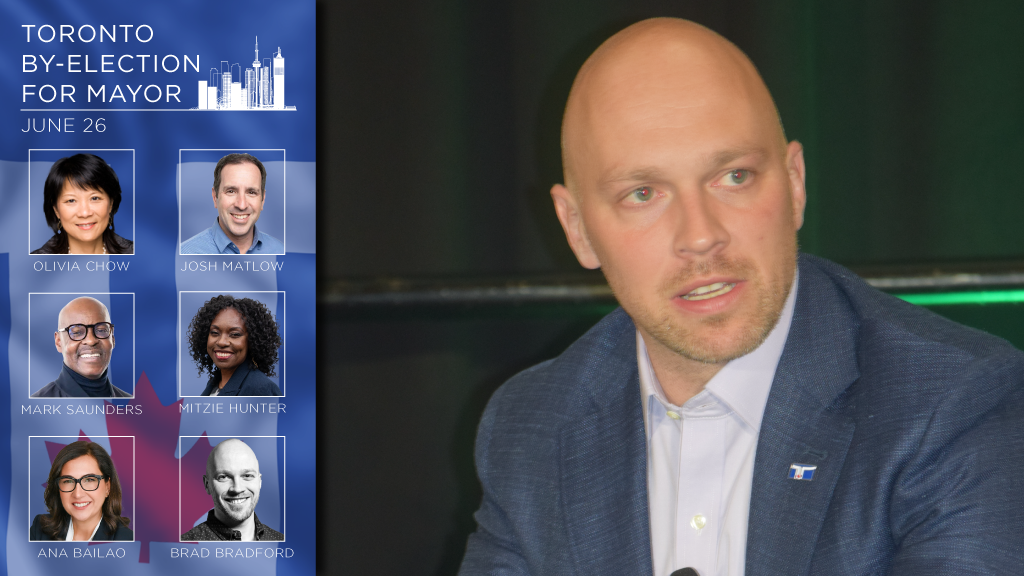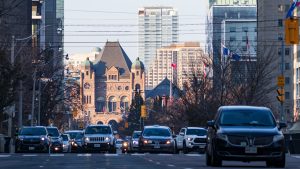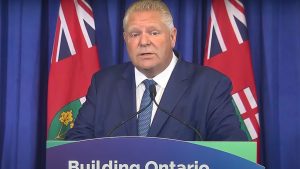Sixth in a series: the Daily Commercial News examines the Toronto mayoral byelection through the lens of the city’s construction sector with a profile story on candidate Brad Bradford.
Ask Toronto mayoral candidate Brad Bradford what’s wrong at city hall and he doesn’t mince words.
Staff inertia, bureaucratic gridlock, policy malaise, divisional silos, lack of accountability and grandstanding by unserious politicians — the list of ills is long, says the former City of Toronto urban planner and second-term city councillor.
The youngest of Toronto’s top-six mayoral candidates at age 36, Bradford says he transformed into a “frustrated optimist” during his three years on staff with the city.
“I saw a pervasive attitude that whatever doesn’t get done today will get done tomorrow,” said the Hamilton-born candidate.
So he ran for city council in 2018, got elected and found himself with a new vantage point from which to diagnose problems.
“There’s just too much talk and not enough action at city hall. And let’s debate, defer, delay, that is holding the city back and running us into a state of decline.
“I am running to be a strong mayor of action and to actually tackle the issues that make a tangible difference in people’s lives. That’s affordability, that’s housing, community safety, and unlocking the gridlock that is grinding our city to a halt.”
There’s no “silver bullet” to the housing crisis, suggests Bradford, saying Toronto needs “1,000 points of innovation” to make a dent in the affordability crisis.
But Toronto is beset with “status quo politicians who have spent and made entire careers opposing housing.”
As chair of Toronto’s planning and housing committee, Bradford said, he successfully orchestrated the recent approval of multiplexes in single-family neighbourhoods across the city.
“It’s a new world in Toronto today,” he said.
As chair, “I’ve done more in five months than has been done over the past five years. And that’s because we need less talk and more action.”
Other candidates are dreaming up housing targets they will never be able to deliver, Bradford said, because they don’t address the approvals barriers at a granular level.
“For years, we have had an adversarial relationship, largely related to the realities of the provincial tribunal system, that pits communities against applicants against the city,” he said, adding there is a deep culture of fear among staff who do not feel supported.
Bradford has spoken to staff at the various Toronto planning divisions and told them they need to make decisions more quickly.
“We need to be flexible, and we need to be collaborative, to unlock housing outcomes, because that is what the future success and prosperity of the city depends on.”
Bradford had similar derision for the plans of fellow candidates Oliva Chow and Josh Matlow to scrap the reconstruction program for the Gardiner Expressway east of Cherry Street; they are in favour of replacing an elevated section linked to the Don Valley Parkway with a roadway at grade. The project was decided on seven years ago, he said.
“They talk about hypothetical savings, but they ignore the actual costs. It’s smoke and mirrors from radical activist politicians who like to make headlines but don’t take the job of local government seriously.”
Bradford also differs from Chow, Matlow and Ana Bailao on the issue of the city’s commitment to use 10 traditional building trades exclusively for work on city construction projects.
He would urge the province to introduce legislation to open up bidding on city work, saying it could save taxpayers $200 million per year due to more competitive bidding.
Generally, the city deserves a “rational, common sense and practical approach to the issues that are facing our city, rather than an ideologically or partisan driven one,” Bradford said.
As an example, he would hire a congestion relief commissioner that would co-ordinate construction on the multiple projects underway or proposed for the downtown.
Bradford also said he would not hesitate to use strong mayor’s powers to move past “endless debate, deferral and delay” and get housing and infrastructure built; he suggests Toronto needs to “stop playing checkers and start playing chess” to get better outcomes for the city at Ontario Place; he said the Doug Ford government was “tone deaf” with its decision to move the Ontario Science Centre with no consultation, calling the facility a “cultural and educational asset”; and he thinks the province should make changes at Metrolinx given its failure to deliver projects such as the Eglinton Crosstown LRT on time.
“While that’s not my decision to make, I am ushering in an era of accountability here at city hall,” said Bradford.










Recent Comments
comments for this post are closed